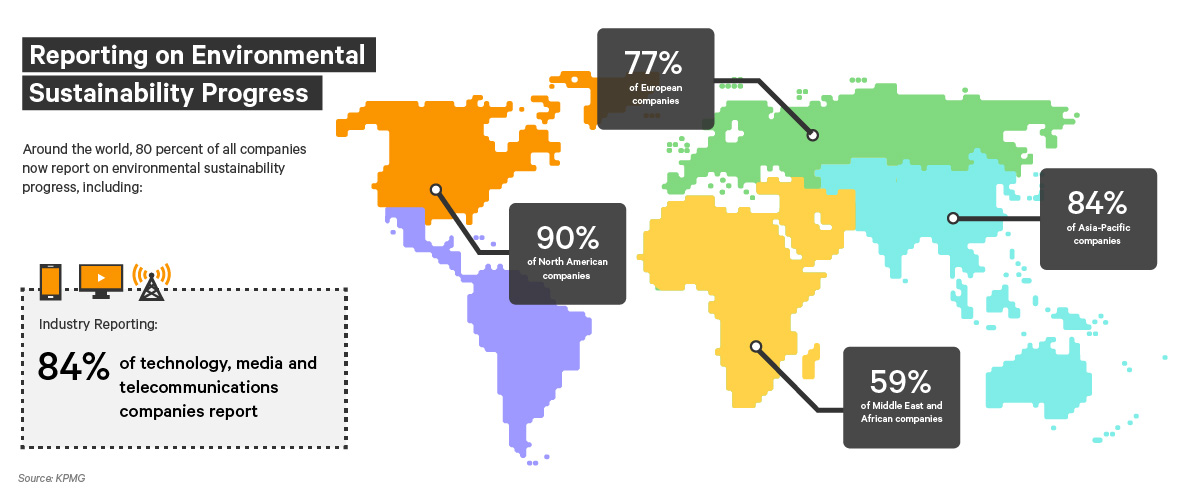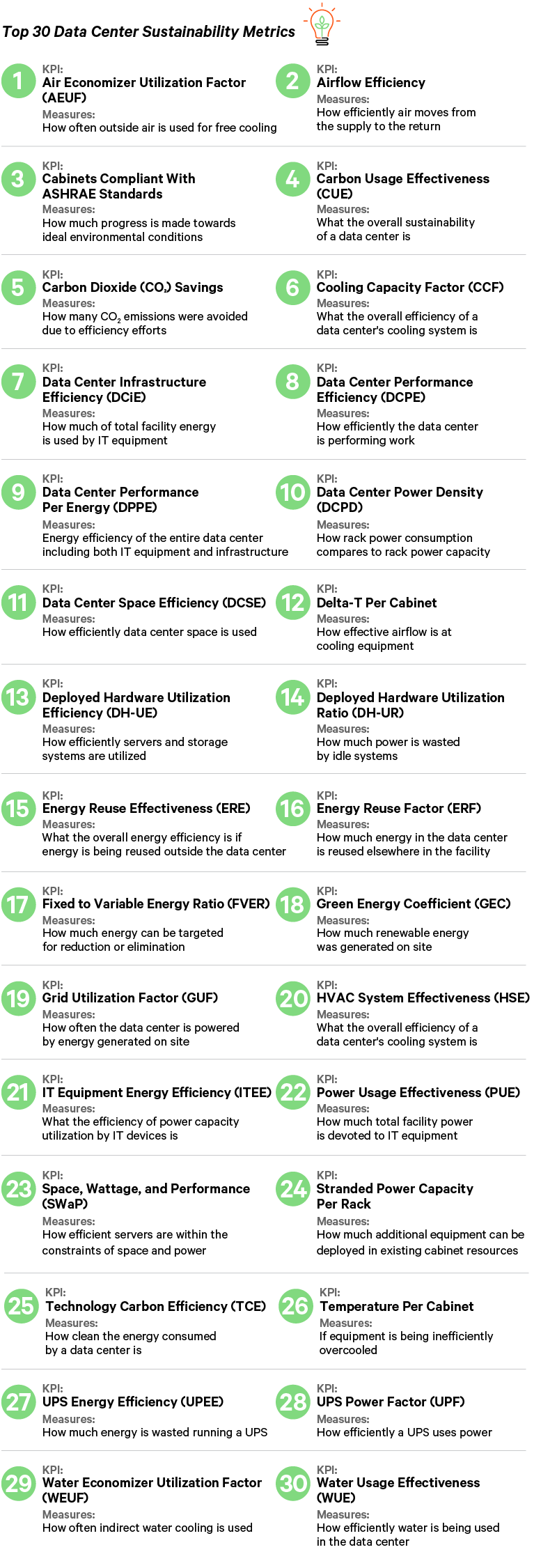
Measuring and Reporting Data Center Efficiency and Emissions
Various frameworks and metrics can play a role in monitoring progress and meeting both mandatory and voluntary reporting requirements. This article provides an overview of popular frameworks, certifications, and metrics related to efficiency and emissions.

Goals and Pacts
Industry associations and other organizations can help in establishing goals and providing support in achieving those goals.
- The European Data Centre Association has adopted the Climate Neutral Data Centre Pact which leverages technology and digitalization to make data centers climate neutral by 2030. Member organizations agree to achieve energy efficiency, clean energy, water, circular economy, and circular energy targets.
- The Science-Based Target Initiative (SBTi) helps companies achieve ambitious climate-related goals by setting science-based emissions reduction targets. The organization provides best practices, technical assistance, and resources to mobilize the private sector to faster action in decarbonizing their business models and processes.
- United Nations Sustainable Development Goals (SDGs) are comprised of 17 interlocked goals that have been adopted by all U.N. member states. The goals promote social, economic, and environmental well-being and equality. In terms of environmental sustainability, data center owners and operators are most affected by:
- Goal 6 – Clean water and sanitation
- Goal 7 – Clean and affordable energy
- Goal 9 – Industry, innovation and infrastructure
- Goal 12 – Responsible consumption and production
- Goal 13 – Climate action
Frameworks and Standards
A number of organizations provide resources and frameworks to streamline managing and reporting on efficiency and emissions.
The Carbon Disclosure Project (CDP) runs a global disclosure system to help manage environmental impact. It includes data on corporate and city action in the areas of climate, water and forests.
The GHG Protocol provides comprehensive, standardized global frameworks that industry organizations can use to understand, aggregate, quantify, and reduce their emissions over time and work with value chain partners to do the same.
The Global Reporting Initiative (GRI) is used by 75% of Global 250 companies. GRI provides both universal and topic standards that enable organizations to report on areas that have significant economic, environmental, and social impacts. GRI also provides guidance on how to link to other goals and standards, such as the SDG and the Sustainability Accounting Standards Board (SASB). With their broader focus, GRI standards are used by organizations to report out to stakeholders, including regulators, investors, and the media.
The Sustainable Digital Infrastructure Association, of which Vertiv is a key sponsor, has developed The Roadmap to Sustainable Digital Infrastructure by 2030. It provides IT manufacturers and buyers with a framework to reduce carbon emissions, energy consumption, electronic waste, and pollution.
The Value Reporting Foundation (VRF) was established to set standards that enable companies to report on ESG issues that could have a material impact on business and are used by organizations to report out to investors and other providers of financial capital.
Task Force on Climate-related Financial Disclosures (TCFD) provides a framework to help public companies and other organizations disclose the climate-related risks and opportunities they face. By using the framework, organizations can assess risks accurately, allocate capital appropriately, and inform strategic planning.
Certifications and Tools
Standards and certifications can help owners and operators evaluate their progress against others in the industry and validate the effectiveness of their decisions.
The Data Center ENERGY STAR Score was designed to expand the U.S. government-backed ENERGY STAR certification to data centers. The Data Center ENERGY STAR score considers the energy performance of a data center relative to its peers, evaluating the climate, weather, and business activities to provide a fair score. Only data centers in the top 25% of energy performance are eligible for ENERGY STAR certification.
The Life Cycle Initiative offers the Life Cycle Sustainability Assessment (LCSA) which measures negative ESG impacts and benefits of key decision making processes. LCSA findings help product designers and manufacturers make choices that increase the sustainability of products across their life cycle.
Open Compute Project (OCP) is a collaborative community that is focused on redesigning hardware technology to support growing market demands. OCP seeks to take a circular economy approach to designing, using, and reusing hardware to decrease waste and the embodied energy these solutions contain. OCP provides two levels of recognition for industry hardware products: OCP Accepted and OCP Inspired. These designations mean that solutions meet at least three of four tenets: efficiency, openness, impact and scale.
Metrics
A wide range of metrics are available to enable data center operators to evaluate and drive improvement in data center systems and overall operations.


